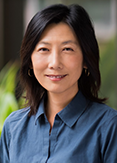Joan Jeung, MD, MPH, FAAP, is Clinical Professor in the Department of Pediatrics, Division of Developmental Medicine at the University of California San Francisco (UCSF) School of Medicine. Dr. Jeung’s research interests center around innovative programs that strengthen behavioral and developmental healthcare capacity in pediatric primary care. Dr. Jeung serves as Senior Associate Director of UCSF’s Child and Adolescent Psychiatry Portal (CAPP), a pediatric mental health care access portal for Northern California. She also directs the Resilience Clinic at UCSF Benioff Children’s Hospital Oakland, a primary care-based, caregiver/child group intervention for young children (ages 0-5) exposed to adversity. Outside of UCSF, Dr. Jeung serves on the Executive Committee for the newly formed American Academy of Pediatrics (AAP) Council on Healthy Mental and Emotional Development (COHMED) and on the AAP Pediatric Mental Healthcare Access National Advisory Group. From 2017-2021, she served on the inaugural executive committee for the Section on Minority Health Equity and Inclusion (SOMHEI).

Joan Jeung, MD, MPH
Director of Resilience Clinic, UCSF Benioff Children’s Hospital; Senior Associate Director, UCSF Benioff Child & Adolescent Psychiatry Portal; Clinical Professor, Department of Pediatrics, Division of Developmental Medicine, University of California San Francisco, CA
Toxic Stress & Child Health Initiative: An Environmental Scan
Objectives:
UCSF Benioff Children’s Hospitals and Harvard University’s Center on Developing Child/Frontiers of Innovation (FOI) are exploring a partnership to create a new innovation cluster that would employ the FOI Translational Science Model (TSM) to facilitate the co-design, testing, evaluation, and scaling of new, science-based innovations mitigating toxic stress in children. This project conducted an environmental scan to assist in planning the innovation strategies of the proposed cluster, focusing on unmet needs for children facing significant adversity; input from key stakeholders; promising new approaches for addressing pediatric toxic stress; and sustainable funding mechanisms.
Background:
For children exposed to trauma or poverty, the body’s physiologic stress response may become overly activated, producing toxic stress. Toxic stress alters early brain development and increases the risk for chronic disease and learning problems, contributing to lifelong disparities in health and educational outcomes.
Methods:
Interviews were conducted with 15 key stakeholders, including parents, pediatricians, social workers, and administrators at UCSF Benioff Children’s Hospital Oakland; pediatric leaders at UCSF School of Medicine; as well as local and state policy-makers, payers, and public health officials. Interviews were also conducted with 12 experts in pediatric behavioral program delivery and/or Medicaid payment reform. Participation in nine meetings/conference calls with stakeholders, along with review of community health needs assessments and selected research literature, supplemented interview findings.
Results:
Multiple interviews highlighted the importance of treating the family, and not just the child; and of addressing financial stress before caregiving skills can be built, even with the most advanced clinical programs. To help parents build serve-and-return (responsive interaction) and executive function (planning, focus) skills, health care systems should create environments rich in serve-and-return interaction as scaffolding on which parental skill building can occur. Primary care also needs a systematic method for identifying and responding proactively to social needs. Since fee-for-service payment poses many barriers to financial sustainability for such family-centered intervention, new integrated payment models are needed that generate cost savings for high utilizers (including adults) to subsidize investment for children yielding long-term health and social benefits.
Future Directions:
If funded, the UCSF BCH-Harvard FOI primary care innovation cluster will start designing innovative approaches to mitigating toxic stress through multi-disciplinary teams including pediatric clinicians, researchers, family partners, and ideally, policy-makers/payers. Pilot programs are anticipated to start at UCSF BCH Oakland, then spread regionally and nationally to help shape a more behaviorally-focused model for pediatric primary care delivery that more effectively addresses health and developmental disparities, with attention to segmented evaluation, rapid cycle learning, and financial sustainability/scalability.
Preceptors:
Tien Ung, PhD, LICSW
Center on the Developing Child,
Harvard University
Jack P. Shonkoff, MD,
Center on the Developing Child at Harvard University
W. Thomas Boyce, MD,
University of California, San Francisco

